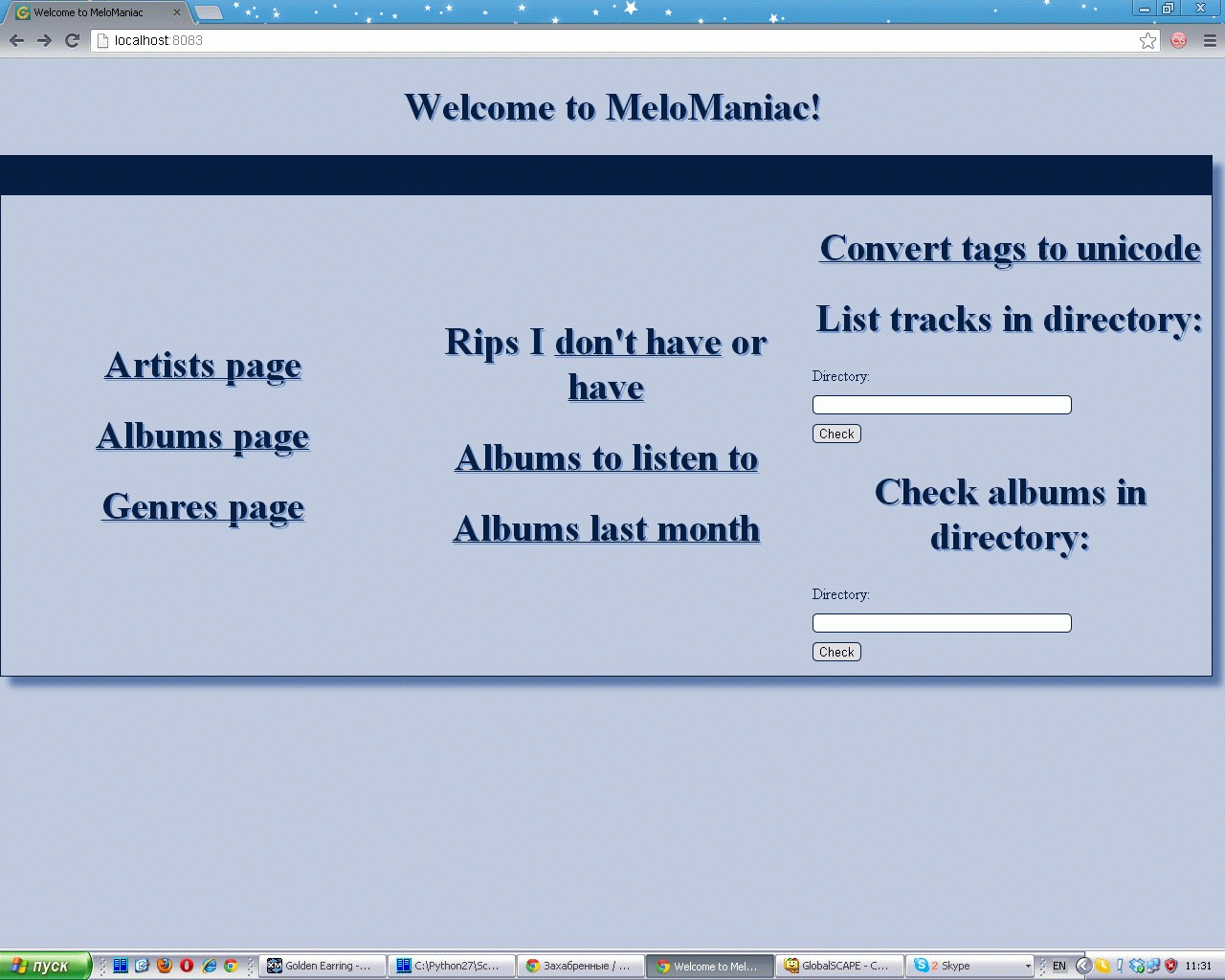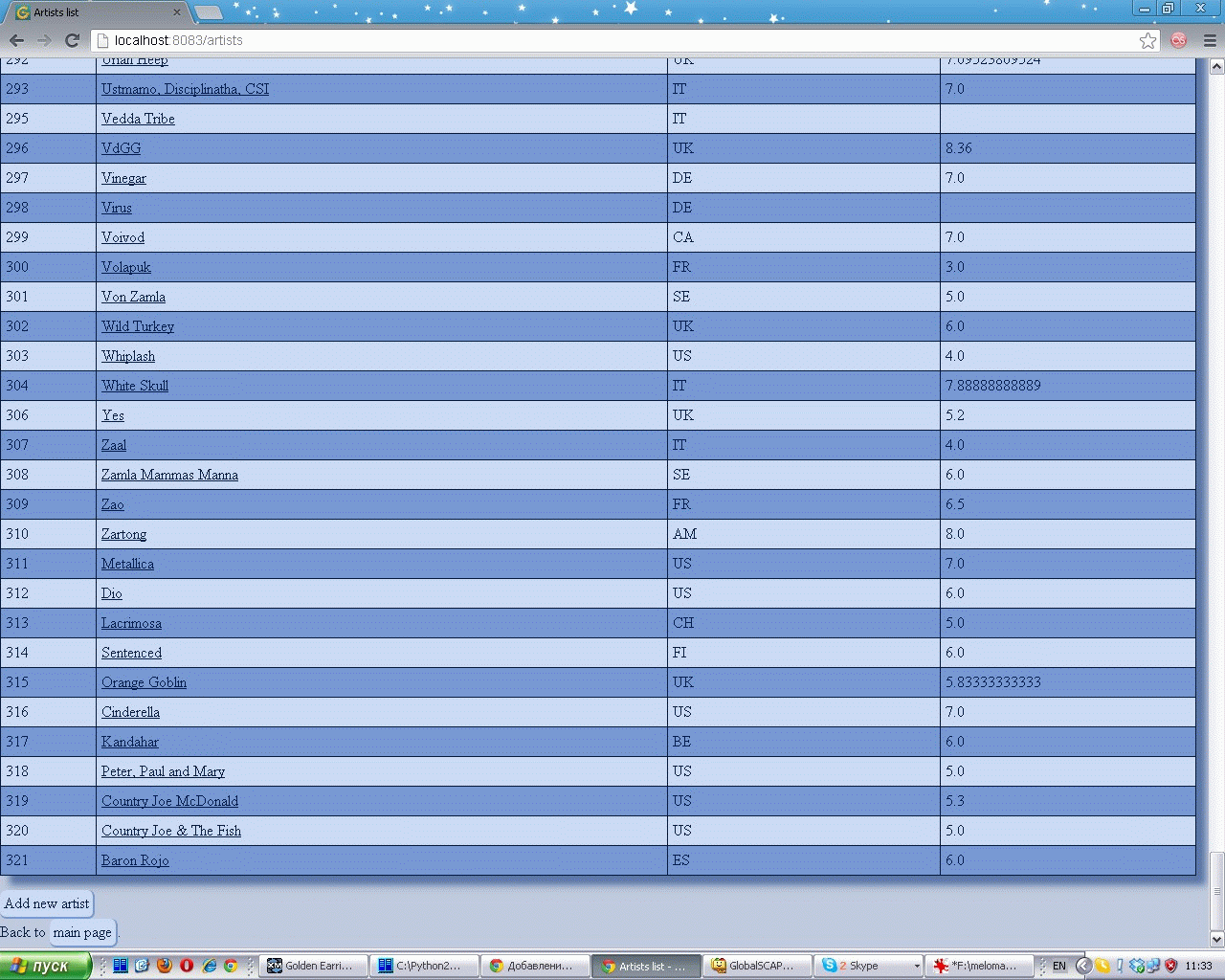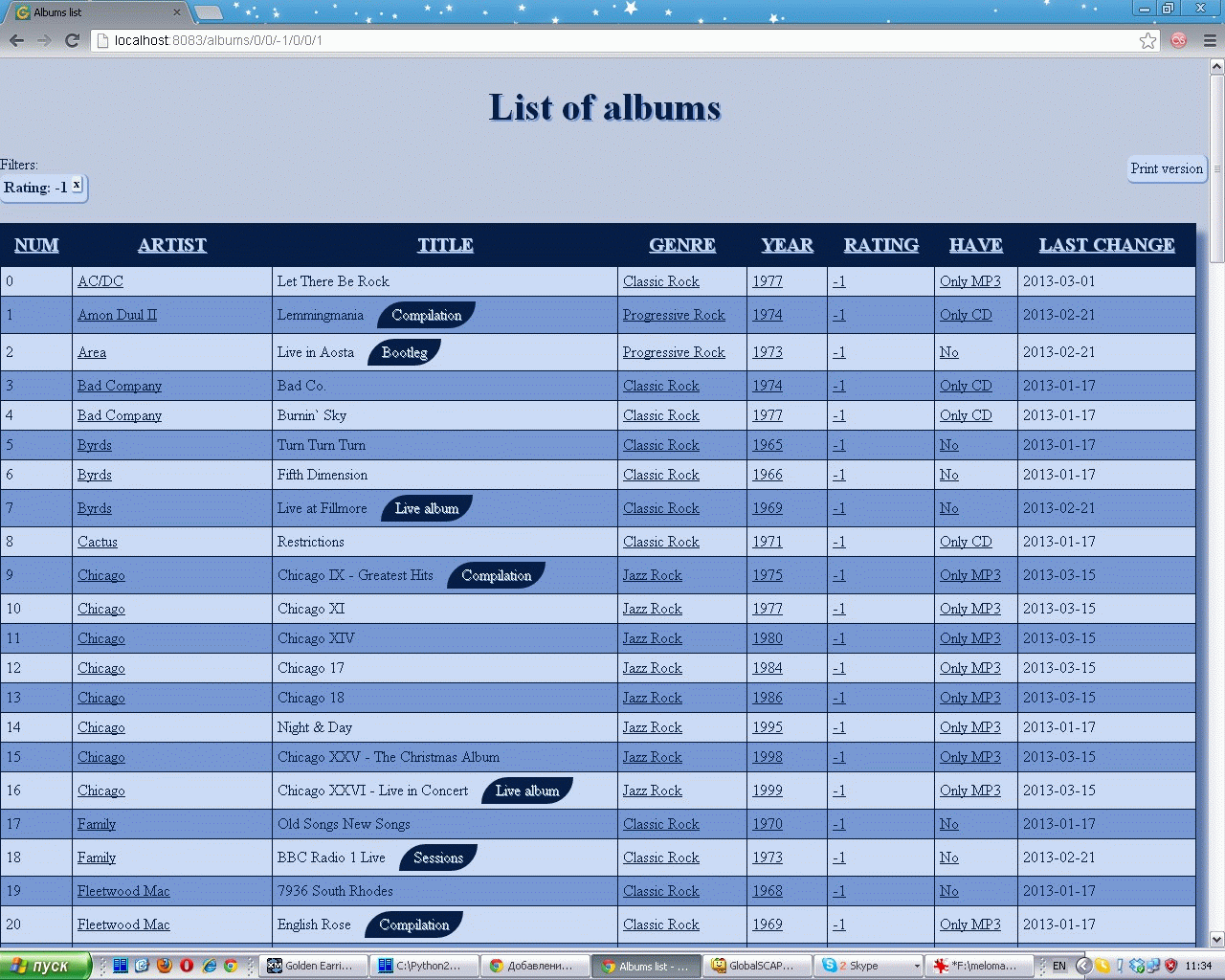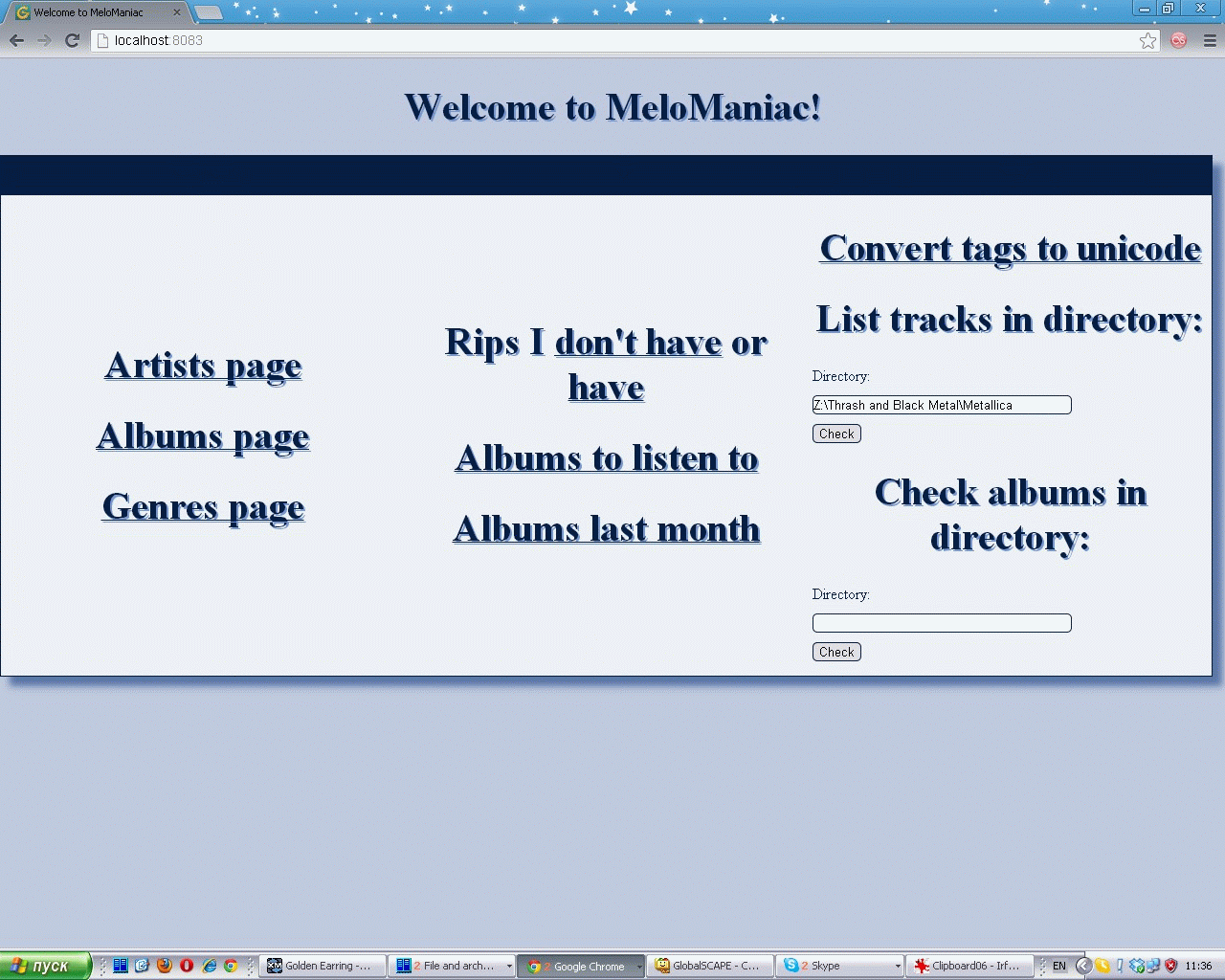MeloManiac — a database of albums for music lovers
At the beginning of this year I started to develop a workflow system for one company, and the conditions needed to work with the framework Turbogears — a Python system to build client-server applications running through the browser. To make it more interesting to deal with new stuff, I simultaneously started writing a system for classification of music albums. The fact that existing such database, which is on the Internet, I was not satisfied with: Last.fm fails to appreciate the albums navigation everywhere uncomfortable, and most importantly — there is no reference to his collection. Offline program like iTunes, me too not satisfied, again because a different original orientation: they are ground under more listening than classification and sorting according to specific criteria, in addition, the functionality had to be added and albums that are not on the computer, and in the form of physical disks.
Why I write here. Interesting to see how this thing is now true, someone who needs it. And there may be some companies interested in such development — then I will be glad to cooperation proposals (dimouse _at_ old-games.ru).
And a few more comments before going on to the point. Initially, the presentation of the programme I wanted to record a video, but on Mature reflection I came to the conclusion that this is unnecessary and you can do multiple slides in the form of gifs. I hope it is acceptable.

With the interface does not bother: there are three main pages to access tables, respectively, artists, albums and genres. Each, of course, implemented basic CRUD functionality, there is the possibility of sorting and filtering tables. This is all very easy to organize thanks to the MVC paradigm that guided the creators of the Turbogears and use SQL Alchemy.

Visit with the artists would like to acknowledge the rating of the contractor which is calculated by the following formula: the albums (except those which are not priced) + the number of albums / 10. This will more or less balanced by the titans, who made several dozen great albums, but a few spoiled the impression a small number of the mediocre or failed albums (and such are all but Mercyful Fate:)), and group bright vystrelivshey only one album, but then did nothing. The result of such a rating I thought was very close to my real preferences, so I use.

The main page is, of course, albums. As was stated in the beginning, in addition to information about the album, and it's where I keep information about its presence. The fact that the base of me began to gather in a text file another n-Noe number of years ago, and many albums that were once inevitably lost, especially mp3-files, so the system can be useful because it can show these albums — they have to find and download. Link "rips I don't have" on the home page is a shortcut to display such records. In addition, I here store information about the presence of my albums in physical form — and some bits here dedicated to the albums released abroad (unfortunately, still the main part of the disc I have is a legacy of the past the pirate of the 90s). Also wanted to add a bit on the availability of the album in the form of records, but has not yet become a — records me a little, although if some audiophiles will want to use it, they will probably need such functionality.
Each change of an entry about the album is written as a "last modified date". In fact, we had to make a separate variable to fix exactly the date of the audition, but still made so, so sorting and filtering by date in the bunch: those albums that are listened to and evaluated, those that have changed data and newly added new (they, however, can be separated from the estimated, as they usually have no rating).
Filling the database manually — it's certainly fun, but it would be strange not to use automated tools for adding data directly from the computer: today music collection is primarily MP3. And the MP3 files have tags that have fans to spread out all on shelves is always a headache as well, not like people to fill in correctly, and indeed to fill. Not to mention the names of the files... So the system Melomaniac on the one hand, verifies that the database and files, and on the other, could "be inhabited by" all at once from there (but first still need to have appropriate service providers) that will be very convenient for those who are just starting their list of albums, not I — tunes already existing list under a written system using a complex chain of conversions (first, I, not yet determined in what form it will be, wrote the system in C using CppSQLite3.

Yes, a few words about the technical implementation. In order to make this happen we need to work with MP3-tags under Python. Such libraries rivet great multitude, so to do something yourself makes no sense. Were taken Mutagen as the most convenient and developed. The Mutagen also have a script to convert all of the tags in Unicode, but under Windows it does not work, so the code has been adapted and included in Melomaniacs. Now, finally, all tracks are displayed fine when I want to listen to music with the TV! Display information about tracks in this directory is more informative, as the information about the tracks in the database yet, although, frankly, sometimes stalling is to do and see which album is the longest in my collection, where most of the songs, etc.
In General, the field for development are enormous: it is possible to speak about the different releases of the same album, linking these albums to specific directories on your computer (or on a network drive, like me), the system checks whether the tracks in these directories and follow the structure of the nesting of these directories and their names (e.g., GENRE/ARTIST/ALBUM/RELEASE), but at the moment I don't want to overload the system underutilized things: I can watch listen to albums and those yet to listen, look at your grades, to compare, have access to an http server program on any of their computers (inside the home grid) — and the more I, in General, and is not necessary.
I will be glad to hear feedback or are interested in using the program people.
Article based on information from habrahabr.ru
Why I write here. Interesting to see how this thing is now true, someone who needs it. And there may be some companies interested in such development — then I will be glad to cooperation proposals (dimouse _at_ old-games.ru).
And a few more comments before going on to the point. Initially, the presentation of the programme I wanted to record a video, but on Mature reflection I came to the conclusion that this is unnecessary and you can do multiple slides in the form of gifs. I hope it is acceptable.

With the interface does not bother: there are three main pages to access tables, respectively, artists, albums and genres. Each, of course, implemented basic CRUD functionality, there is the possibility of sorting and filtering tables. This is all very easy to organize thanks to the MVC paradigm that guided the creators of the Turbogears and use SQL Alchemy.

Visit with the artists would like to acknowledge the rating of the contractor which is calculated by the following formula: the albums (except those which are not priced) + the number of albums / 10. This will more or less balanced by the titans, who made several dozen great albums, but a few spoiled the impression a small number of the mediocre or failed albums (and such are all but Mercyful Fate:)), and group bright vystrelivshey only one album, but then did nothing. The result of such a rating I thought was very close to my real preferences, so I use.

The main page is, of course, albums. As was stated in the beginning, in addition to information about the album, and it's where I keep information about its presence. The fact that the base of me began to gather in a text file another n-Noe number of years ago, and many albums that were once inevitably lost, especially mp3-files, so the system can be useful because it can show these albums — they have to find and download. Link "rips I don't have" on the home page is a shortcut to display such records. In addition, I here store information about the presence of my albums in physical form — and some bits here dedicated to the albums released abroad (unfortunately, still the main part of the disc I have is a legacy of the past the pirate of the 90s). Also wanted to add a bit on the availability of the album in the form of records, but has not yet become a — records me a little, although if some audiophiles will want to use it, they will probably need such functionality.
Each change of an entry about the album is written as a "last modified date". In fact, we had to make a separate variable to fix exactly the date of the audition, but still made so, so sorting and filtering by date in the bunch: those albums that are listened to and evaluated, those that have changed data and newly added new (they, however, can be separated from the estimated, as they usually have no rating).
Filling the database manually — it's certainly fun, but it would be strange not to use automated tools for adding data directly from the computer: today music collection is primarily MP3. And the MP3 files have tags that have fans to spread out all on shelves is always a headache as well, not like people to fill in correctly, and indeed to fill. Not to mention the names of the files... So the system Melomaniac on the one hand, verifies that the database and files, and on the other, could "be inhabited by" all at once from there (but first still need to have appropriate service providers) that will be very convenient for those who are just starting their list of albums, not I — tunes already existing list under a written system using a complex chain of conversions (first, I, not yet determined in what form it will be, wrote the system in C using CppSQLite3.

Yes, a few words about the technical implementation. In order to make this happen we need to work with MP3-tags under Python. Such libraries rivet great multitude, so to do something yourself makes no sense. Were taken Mutagen as the most convenient and developed. The Mutagen also have a script to convert all of the tags in Unicode, but under Windows it does not work, so the code has been adapted and included in Melomaniacs. Now, finally, all tracks are displayed fine when I want to listen to music with the TV! Display information about tracks in this directory is more informative, as the information about the tracks in the database yet, although, frankly, sometimes stalling is to do and see which album is the longest in my collection, where most of the songs, etc.
In General, the field for development are enormous: it is possible to speak about the different releases of the same album, linking these albums to specific directories on your computer (or on a network drive, like me), the system checks whether the tracks in these directories and follow the structure of the nesting of these directories and their names (e.g., GENRE/ARTIST/ALBUM/RELEASE), but at the moment I don't want to overload the system underutilized things: I can watch listen to albums and those yet to listen, look at your grades, to compare, have access to an http server program on any of their computers (inside the home grid) — and the more I, in General, and is not necessary.
I will be glad to hear feedback or are interested in using the program people.
Комментарии
Отправить комментарий